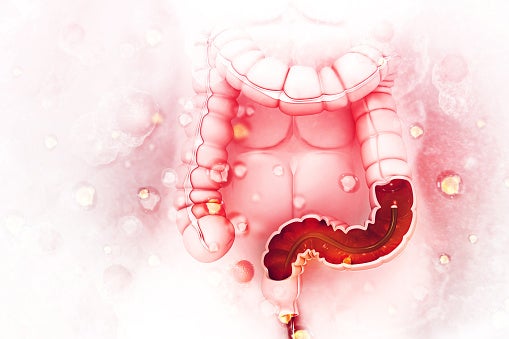Colorectal Conditions
 The colon, also known as the large intestine, is in the lower part of the digestive tract. It is the last part of the journey for digestion and where primarily water is absorbed, solidifying waste. From there, the waste moves into the rectum and is released.
The colon, also known as the large intestine, is in the lower part of the digestive tract. It is the last part of the journey for digestion and where primarily water is absorbed, solidifying waste. From there, the waste moves into the rectum and is released.
At times, diseases and conditions can occur in this important organ, including colon cancer and benign growths, infection or trauma, bowel obstruction, Crohn’s disease and ulcerative colitis. Some of these conditions can be treated with medications and dietary modifications, but in some cases, surgery to remove part of the colon is medically necessary.
WakeMed’s experienced colorectal surgeons and gastroenterologists offer compassionate, personalized care for colorectal conditions at convenient locations throughout Wake County.
Make an Appointment
919-350-PREP (7737)Request an Appointment
RequestConditions We Treat at WakeMed
Colon Cancer: Colon cancer is cancer that starts in the large intestine (also known as the colon), which is in the lower part of the digestive tract.
Rectal Cancer: Rectal cancer is cancer that starts in the lining of the rectum, which is the last six inches of the colon, or large intestine.
Anal Cancer: Anal cancer is cancer that starts in the tissues of the anus.
Abscesses and Fistulas: An anal abscess is an infected, pus-filled cavity near the anus or rectum, and an anal fistula is a tunnel under the skin that connects the infected glands to the abscess.
Anal Fissures: Anal fissures are small tears in the lining of the anus.
Anal Warts (condyloma): Anal warts, or condyloma, are a type of genital wart that are found either inside or around the anus.
Colovesical Fistula: Colovesical fistula is a rare condition that occurs when there’s an opening between the colon and the bladder, allowing fecal matter to enter the bladder.
Constipation: Constipation is defined as infrequent bowel movements (generally every three or more days).
Crohn's Disease: Crohn’s disease is a recurring inflammatory bowel disease of the gastrointestinal (GI) tract.
Diverticulitis: Diverticulitis occurs when small pouches form in the digestive system — most often in the large intestine — and become inflamed.
Fecal Incontinence: Fecal incontinence, or encopresis, is the inability to control bowel movements, which can cause stool to leak from the body.
Hemorrhoids: Hemorrhoids – or swollen blood vessels in the anus and lower rectum — are very common in adults.
Presacral Tumors: These rare tumors may develop in the area between the rectum and the bottom portion of the spine (sacrum).
Pruritus Ani: Pruritus ani is intense, chronic itching in the area around the anus.
Rectal Prolapse: Rectal prolapse is a condition in which the rectum protrudes through the anus.
Rectovaginal Fistula: A rectovaginal fistula occurs when there’s an opening between the rectum and the vagina. This opening allows gas and stool to pass through the vagina.
Ulcerative Colitis: Ulcerative colitis is an inflammatory bowel disease that occurs primarily in the colon, or large intestine.
Colorectal Procedures We Provide
Find out more about the colorectal procedures that our experienced WakeMed gastroenterologists and colorectal surgeons provide.